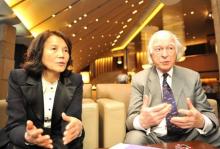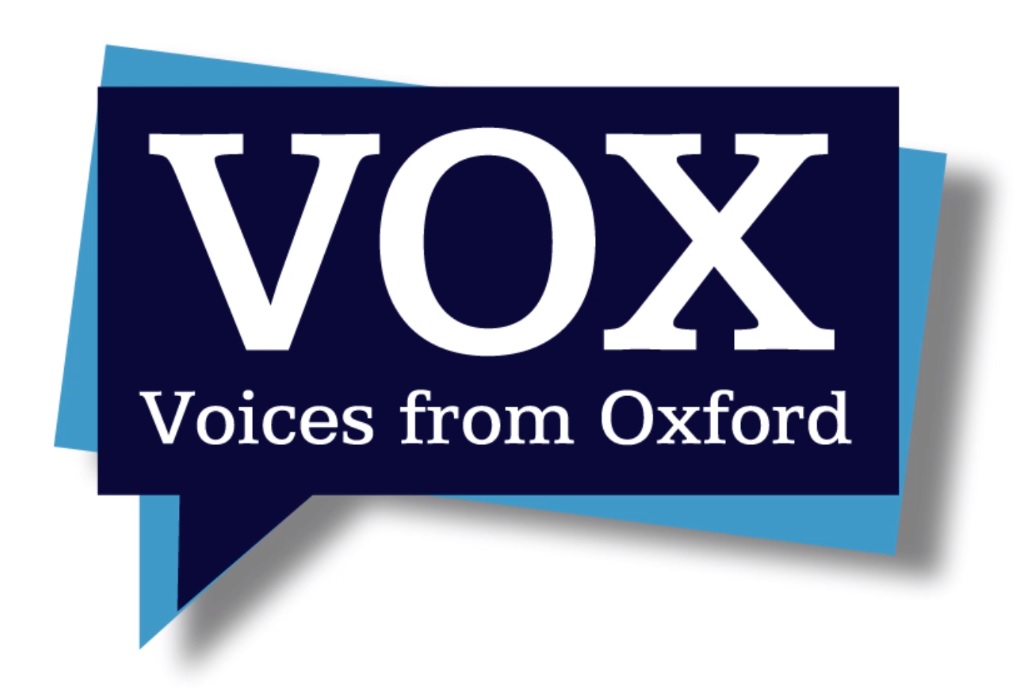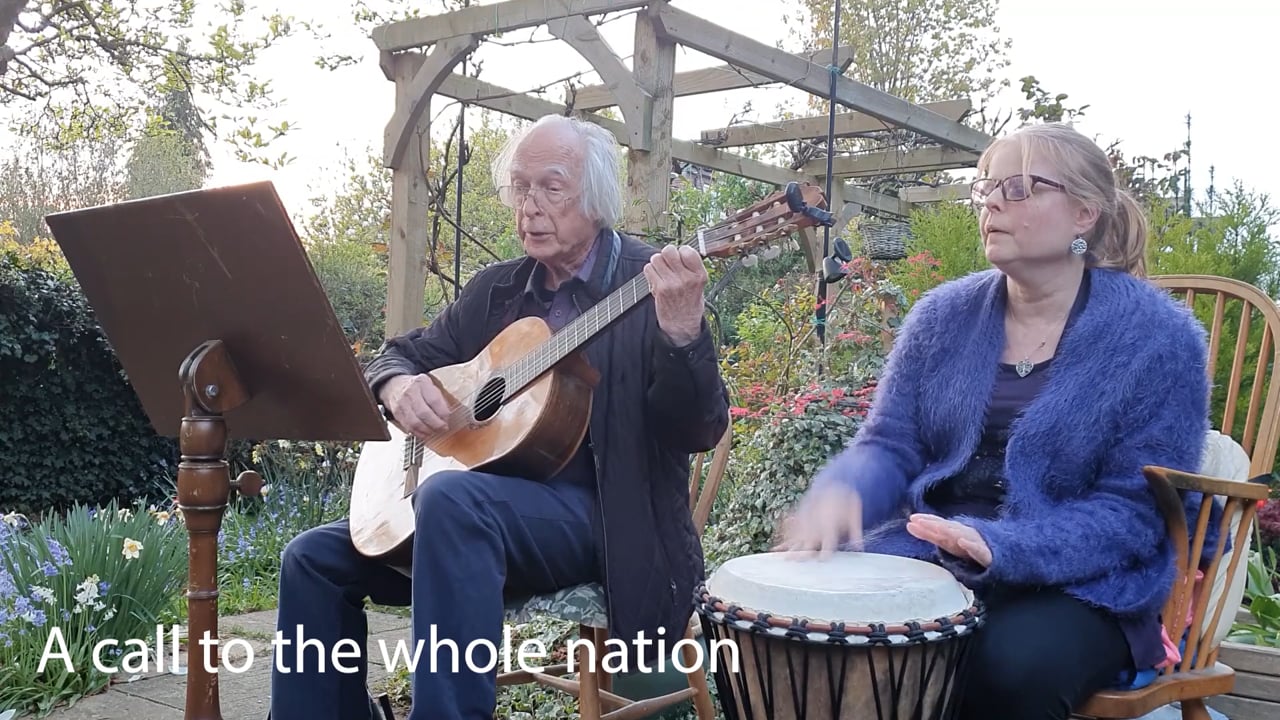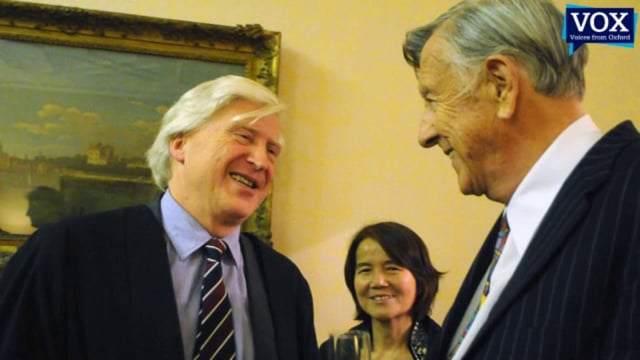
Kim Sung-hee, left, director of the Voices from Oxford (VfO), and Denis Noble, the main presenter of the documentary program said in an interview with The Korea Times at Shilla Hotel in Seoul, Tuseday, that VfO will make Oxford University more accessible around the world and enable many people to benefit from the research and activities of the university.
Korea Times Photo by Shim Hyun-chul
By Kang Shin-who
More and more top global universities have started to share their quality lectures and research results on the Internet with people around the world. Oxford University, the oldest English-speaking higher education institute, has also joined in the trend. However, the Oxford method is rather new and different from other universities.
Instead of simply broadcasting lectures and seminars as other
universities do, Oxford has been providing television quality
documentaries featuring its research, activities and interviews with
world-renowned professors, students and alumni on YouTube.
With the growing importance of Internet education, the university
founded the Oxford Internet Institute eight years ago and it has
recently started to run the Voices from Oxford (VfO) program for the
documentary broadcasting project.
In an interview with The Korea Times, Tuesday in Seoul, Denis Noble,
main presenter of the program and Kim Sung-hee, director of the program,
said VfO will make Oxford University more accessible around the world
and enable many people to benefit from the research and activities of
the university.
“University should reach out to the world showing what they are doing
as it gets a lot of funding from taxpayers, that’s one reasons for
having this program,” said Noble, who is also a director of
Computational Physiology at the university.
“This new broadcast was inspired by the BBC program “Letter from
America,” broadcast for many years by Alistair Cooke. But in the 21st
century, we are, inevitably, using video, not just audio,” said Kim,
who is also an alumnus of the university and visiting professor in the
graduate school of Journalism and Mass Communication at Sungkyunkwan
University. Kim was also the presenter of BBC English and Oxford English
on EBS TV.
Asked how Korean university students can make use of the program, Noble
said “It is very simple. If students are thinking about the
possibility of studying at our university, they can get good insight
through the documentaries. They can also get audio and visual
experiences of what professors do.”
The two professors, who initiated the program, said they will
encourage, first, Korean universities that collaborate with Oxford to
join in the program. “We don’t know yet how many universities will take
same idea (with us). The chances are more universities will be doing it
in the future,” Noble said.
Oxford Voices
Kim explained that Korean universities might interview experts on
issues here such as the nuclear weapon crisis and put together the films
into the VfO documentaries. Currently, Yonsei University, Korea
University, Sungkyunkwan University and Seoul National University (SNU)
collaborate academically with Oxford and Noble met presidents of the
universities and visited the Korea Foundation while in Korea.
Recently, SNU donated 400 volumes of reproductions of classical Korean
texts, that are now preserved in the Kyujanggak Royal Library at the
university, to the library at Oxford, and VfO has made a documentary
dealing with the archives during the Joseon Dynasty. Starting with the
film, VfO plans to cover more stories about Korea in the documentaries.
Noble stressed their webcast program can easily offer access to the
university’s world-class specialists and experts, who are extremely
busy. They explained it takes several months to make the 15-minute
documentaries and VfO team plans to annually produce about 50 films.
“The approach of VfO is similar to that of the top TV producers. We’re
aiming for high quality, both in the filming itself using high
definition, and several cameras working simultaneously, and in the
material of the interview,” Kim said.
Currently, there are eight documentary and interview films on its
website at www.voicesfromoxford.org. Oxford University Vice-Chancellor
John Hood features prominently on the website. He was interviewed on the
topic “Universities and the Financial Crisis.” The Vice-Chancellor
analyses the impact of the recession on Oxford and universities
generally and how they in turn can help the world through this crisis.
Another documentary film featuring an interview with David Vines,
economy professor at the university, brings his research experience to
bear on advising world leaders on the credit crunch. He develops ideas
based on working with Nobel-prize winning economists to chart the way
forward and explains how Oxford research is building on the groundwork
developed by Keynes for the great depression of the 1930s.
The interview with Andrew Goudie, environment expert at the university,
deals with climate change and the environment. He started work on
climate change and desertification 40 years ago ― long before current
concerns about global warming ― and has published more than 30 books in
the process. He also reveals how Oxford research is contributing to the
actions of governments.
Communication Research
Frances Cairncross, rector of Exeter College at the university and a
former editor of The Economist, talks about her books revealing some of
the changes in companies produced by the internet from its very
inception.
The latest production, entitled “New Man Comes to Oxford,” on the
topic of the art of Antony Gormley, gives an impression of the standard
strived for. “ The VFO team was on site from 7 a.m. and stayed all day
to make sure they caught every important moment of the sculpture’s
placement,” Kim said. “No one else got this detailed record, which
will be valued and used in many research areas, including work in Antony
Gormley’s own team, and by Exeter College, where the sculpture now
proudly stands.”
“In one sweeping stroke, VfO has managed to wipe out those boundaries
with a little help from online technology. Covering research and debates
over a wide spectrum of interdisciplinary issues, it now helps to stage
Oxford as the center of lively discussions,” said Lee Jung-hoon,
professor of Yonsei University. “Denis Noble, anchor for the program,
is superb with probing questions and clear-cut explanations. As an
Oxford alum myself, I’m very excited about the prospect of Oxford
becoming, at last, the global venue of cutting-edge educational
discourse.”
“The VfO team view this as an effort to communicate research to a
broader audience in a way that enables the audience to comment and
contribute to the subject matter. In doing so, VfO is confronting a
tradition in the sciences and humanities that sees the job of the
researcher to stop when the refereed journal article is written, and
leave it to the press, media and word of mouth to enable findings to
trickle-down to potential users,” said Willian Dutton, professor at the
university and one of the editors of the program.
“Our view is that it is right for researchers to take a more active
role in communicating research directly to a broader public,” he added.



